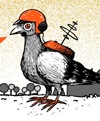The rise of the sensor citizen
In her critical contribution ‘The rise of the sensor citizen – community mapping projects and locative media‘, she takes a close look at community mapping and sensing projects, and points out both the opportunities and challenges for activism made possible by locative technologies.
“Community mapping and sensing projects that use commonly available consumer electronics as environmental measurement devices, enable people to collect and view a wide array of location-based data. As a form of public science, such projects stand to reinvigorate environmentally focused civic engagement. However, given public concerns around environmental risks and their connections to technological progress, I believe that this kind of active citizenship should promote more critical reflection on the values and goals of the very projects that expect to create such profound changes in these domains, and carefully consider the limits of its own power.”
Anne Galloway (site | blog) recently completed a PhD in sociology and anthropology at Carleton University, Ottawa, Canada, which involved conducting an ethnographic study of the design of mobile and pervasive technologies. She is interested in connections between technological, spatial and cultural practices, and her current research explores design as a social and cultural activity and asks how social and cultural relations are designed. Galloway’s work has been presented to international audiences in technology, design, art, architecture, social and cultural studies, as well as published in a variety of books and journals. She currently teaches design and computation arts at Concordia University in Montreal, Canada.




